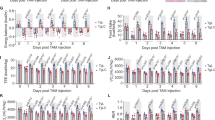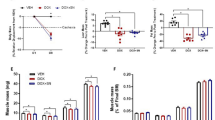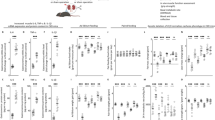Abstract
Inappropriate hepatic lipogenesis, hypertriglyceridaemia, decreased fatty acid oxidation and muscle protein wasting are common in patients with sepsis, cancer or AIDS. Given carnitine's role in the oxidation of fatty acids (FAs), we anticipated that carnitine might promote FA oxidation, thus ameliorating metabolic disturbances in lipopolysaccharide (LPS)- and methylcholanthrene-induced sarcoma models of wasting in rats. In the LPS model, rats were injected with LPS (24 mg kg-1 i.p.), and treated with carnitine (100 mg kg-1 i.p.) at -16, -8, 0 and 8 h post LPS. Rat health was observed, and plasma inflammatory cytokines and triglycerides (TG) were measured before and 3 h post LPS. In the sarcoma model, rats were implanted subcutaneously with tumour, and treated continuously with carnitine (200 mg kg-1 day-1 i.p.) via implanted osmotic pumps. Tumour burden, TG and cytokines were measured weekly for 4 weeks. Carnitine treatment significantly lowered the tumour-induced rise in TG (% rise) in the sarcoma model (700 +/- 204 vs 251 +/- 51, P < 0.03) in control and carnitine groups respectively. Levels of interleukin-1 beta (IL-1 beta), interleukin-6 (IL-6) and tumour necrosis factor-alpha (TNF-alpha) (pg ml-1) were also lowered by carnitine in both LPS (IL-1 beta: 536 +/- 65 vs 378 +/- 44: IL-6: 271 +/- 29 vs 222 +/- 32; TNF-alpha: 618 +/- 86 vs 367 +/- 54, P < or = 0.02) and sarcoma models (IL-1 beta: 423 +/- 33 vs 221 +/- 60; IL-6: 222 +/- 18 vs 139 +/- 38; TNF-alpha: 617 +/- 69 vs 280 +/- 77, P < or = 0.05) for control and carnitine groups respectively. We conclude that carnitine has a therapeutic effect on morbidity and lipid metabolism in these disease models, and that these effects could be the result of down-regulation of cytokine production and/or increased clearance of cytokines.
This is a preview of subscription content, access via your institution
Access options
Subscribe to this journal
Receive 24 print issues and online access
$259.00 per year
only $10.79 per issue
Buy this article
- Purchase on SpringerLink
- Instant access to full article PDF
Prices may be subject to local taxes which are calculated during checkout
Similar content being viewed by others
Author information
Authors and Affiliations
Rights and permissions
About this article
Cite this article
Winter, B., Fiskum, G. & Gallo, L. Effects of L-carnitine on serum triglyceride and cytokine levels in rat models of cachexia and septic shock. Br J Cancer 72, 1173–1179 (1995). https://doi.org/10.1038/bjc.1995.482
Issue Date:
DOI: https://doi.org/10.1038/bjc.1995.482
This article is cited by
-
Efficacy and Safety of Valproic Acid for Spinal Muscular Atrophy: A Systematic Review and Meta-Analysis
CNS Drugs (2019)
-
Inflammation and l-carnitine therapy in hemodialysis patients: a review
Clinical and Experimental Nephrology (2015)
-
Effect of L-carnitine supplementation on maturation and early embryo development of immature mouse oocytes selected by brilliant cresyle blue staining
Journal of Assisted Reproduction and Genetics (2015)
-
Investigation of inflammatory profile in MSUD patients: benefit of L-carnitine supplementation
Metabolic Brain Disease (2015)
-
Mechanisms underlying the anti-wasting effect of l-carnitine supplementation under pathologic conditions: evidence from experimental and clinical studies
European Journal of Nutrition (2013)



